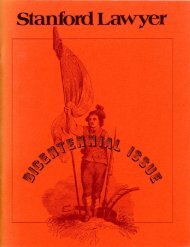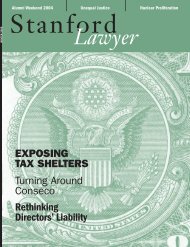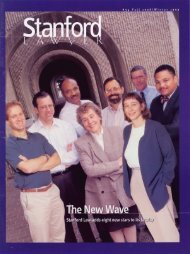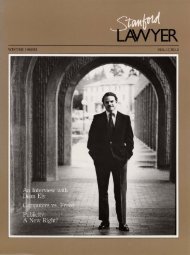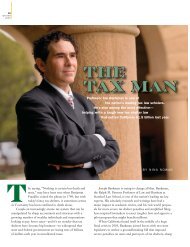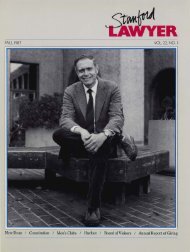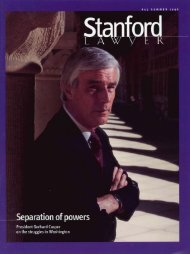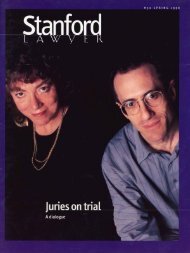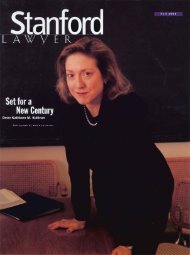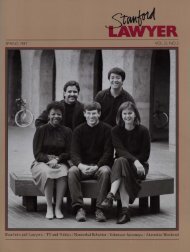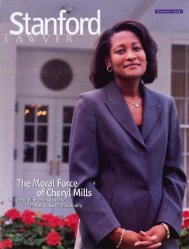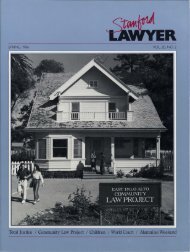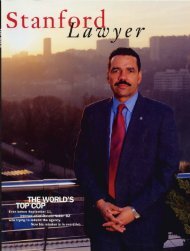BabcockAwarded anHonorary LL.D.by San DiegoProfessor Barbara Babcockreceived a Doctorof Laws (honoris causa)degree from the <strong>University</strong>of San Diego onMay 22.The degree was con~ferred by USD PresidentArthur E. Hughes duringthe university's lawschool commencementceremonies, where Babcockwas the featuredspeaker.BabcockShe was praised, inthe citation, as a "brilliantscholar, accomplishedlawyer, dedicatedpublic servant,role model for women,and major contributor toour collective nationalsense of justice andequal opportunity."The previous month,on April 5, Babcock presentedan endowed annuallecture at the Cleveland-MarshallCollege forLaw.In her lecture, sheaddressed the difficultquestion, "How can youdefend someone who isguilty?""I tried," she later explained,"to bringtogether my experienceas a public defenderwith the opportunity I'vehad in four years ofteaching criminal procedureto reflect on thisissue."I'm as interested inworking out the answersfor myself as for mylisteners," she added.The text of her lecturewill be published in theCleveland-Marshall lawreview.Babcock joined the<strong>Stanford</strong> Law faculty in1972, after nine years asa defense attorney inWashington, D.C., firstwith Edward Bennett Williams,and then with theLegal Aid Agency of theDistrict (subsequently renamedthe Public DefenderService), whichshe directed from 1968to 1972.In 1977 she returnedto Washington, whereshe served for two yearswith the U.S. JusticeDepartment as assistantattorney general, incharge of the civil division.Professor Babcockteaches introductory andadvanced courses in criminallaw, as well as thefirst-year Civil Procedurecourse. She wasawarded the John BinghamHurlbut Award forExcellence in Teachingby the graduating Classof 1981.•Reagan Names McBride to CrimeCommissionAssociate Dean Thomas F. McBride has beentapped by President R.eagan ~o serve on the newCommission on Organized Crime. , ,The executive order establishing the commiSSionwas signed by the President July 28 in a Rose Gardenceremony attended by McBride and othermembers of the 20-member group,The purpose of the commission, Re,agan said, isto "break apart and cripple the organized syndicatesthat for too long have been tolerated inAmerica."Judge Irving R. Kaufman of the U.S. Court. of .Appeals (2d Circuit) will head the group, which wll~fiold public hearings across the country and submita report on March 1, 1986."We've been given a broad mandat~ by the President,"Judge Kaufman said, "and we Intend to exerciseit."Commission members include former SupremeCourt Justice Potter Stewart and the Chairmen ofboth the Senate and House judiciary committees Senator Strom Thurmond and Representative PeterRodino, Jr.McBrideMcBride, who came to the School last Oc~ober asAssociate Dean for Administration, had previouslyheld a variety of oversight positions with the federalgovernment, most recently as Inspector General ofthe Department of Labor. ,(An article by McBride on co~puter us~ In detectingfraud and waste appeared In the prevIous <strong>Stanford</strong><strong>Lawyer</strong> issue.)•52<strong>Stanford</strong> <strong>Lawyer</strong> <strong>Fall</strong> <strong>1983</strong>
Student Exposure to Career'Alternatives' - Dean Ely's MemoDean Ely discussed issues concerning careerchoices in the following memorandum to <strong>Stanford</strong>Law students, distributed on January 25. The memorefuted suggestions by some students that theSchool channels them into corporate law, and describedcontinuing and new resources available tothose wishing to explore career alternatives. At thesame time, the Dean challenged the assumption thata career in corporate law necessarily precludespublic service activities. Because of the considerableinterest in these issues expressed bygraduates and friends of the School, the editorreprints the Dean's memo in full below.The world of our professionis large. Its practitionersand its roles areremarkably diverse, asare the rewards it offersnotsimply in financialterms but also in excitement,intellectual fascination,and the satisfactionthat can flow from publicservice or the helping ofothers. A number of youhave suggested to me,however, that the Schoolis doing too little to acquaintits students with this range of rewards, thatinstead our curriculum and financial aid policies aregeared so as to channel you all into large corporatelaw firms.To be honest, I think there is a good deal ofrationalization involved in these charges, that thewidespread choice of corporate law practice on thepart of our students is simply reflective of a combinationof interest in the sort of problems that oneencounters in such a practice, and concern forfinancial security for oneself and one's family whichis particularly understandable in these uncertaineconomic times. I don't think rationalization is all thatis involved, however, and it is because I do not thatI am taking the modest steps outlined in this memorandum.The administration of this School has no desire tosteer <strong>Stanford</strong> students in any particular career direction,and in particular no desire to steer themaway from practice in large corporate law firms.Such practices can offer a high excitement that maybe unavailable elsewhere, and, like every other formof legal endeavor, a corporate practice can providean attorney with opportunities to help 'make theworld a more habitable place for us all. (Like everyother kind of legal job, it can be performed eithermorally or immorally, depending on who is performingit.) Nor need a career in a corporate law firm entailan entirely uniform practice: Our profession isfilled with examples of men and women whose basicallylarge firm practices have involved significantactivity, intermittent or continuing, devoted quite explicitlyto serving the profession and the public.What we seek, instead, is increased exposure forour students, or rather increased opportunities forexposure, to various lawyers' activities occurring outsidethe standard large corporate practice. Somefew of you, thus exposed, may end up deciding thata "different" sort of career is what you wish at leastinitially to pursue. A greater number will probablyuse the breadth of experience thus gained to enrichand enliven what willnonetheless remain primarilya large firm practice.Beyond that, exposure to something of therange of lives and activitiesour profession offerswill simply make you abetter educated law studentand lawyer, providingyou with tools to enrichour various discussionshere at the School and thecontributions you will beable to make later in life asa practitioner, of whatever kind, and as a citizenlawyerconcerned (in the voting booth or elsewhere)with the enlightened formulation of public policy.1. One thing I and other members of the administrationhave done so far is to meet with students todiscuss this subject. Many of you have expressedsurprise at the number of students who came tothese meetings. What we said there may have beenof some help, but more important, I think, was thesymbolism, the fact that students contemplatingcareers other than entirely in large corporate lawfirms, or at least wishing the School provided moreexposure to such "alternatives," actually saw (a) theDean of the School indicating that their aspirationsand curiosities were not in his opinion evidence ofmental illness, and, perhaps more importantly (b) aroom full of fellow students who seemed to beentertaining the same "deviant" curiosities that theywere. I am told that those meetings may in somesmall way have helped set the student body talking,talking in particular in a way that recognizes that unlikemost people on this earth, you really do havemany choices about how you will spend the rest ofyour lives.(continued)<strong>Fall</strong> <strong>1983</strong> <strong>Stanford</strong> <strong>Lawyer</strong>53
- Page 1 and 2:
RFAll 1983VOL. 18, NO.1Heroin Optio
- Page 3 and 4: jah(e,oYCONTENTSSTANFORD lAWYEREdit
- Page 5 and 6: Business Law vs. Public Interest La
- Page 7 and 8: By John Kaplanjockson Eli ReynoldsP
- Page 9 and 10: maintenance almost entirely up toth
- Page 11: smaller percentage of British addic
- Page 14 and 15: that, because of regulation, cannot
- Page 16 and 17: of a whole variety of new mortgagei
- Page 18 and 19: ConversationsWith Five AlumniBy Mic
- Page 20 and 21: y landlords and tenants about rents
- Page 22 and 23: when I was studying law and she was
- Page 24 and 25: ~o(1)AtISSUE *Union 'Rights' in the
- Page 26 and 27: AtISSUECongressional Responses toSu
- Page 28 and 29: AtISSUEPrison Labor:TimeTo Take Ano
- Page 30 and 31: Graduates and friends of theSchool
- Page 32 and 33: ~o~ 4'-VVcYi~STATE OF THE SCHOOLJoh
- Page 34 and 35: ~o~ Cff-VIMtu'0r-STATE OF THE SCHOO
- Page 36 and 37: ~o~ 4-(/141~STATE OF THE SCHOOL con
- Page 38 and 39: ~o~4VJ41~SUCCESSFUL LAWYERING:IMPLI
- Page 40 and 41: ~o~of-VJM~SUCCESSFUL LAWYERING cont
- Page 42 and 43: @.oarcA 4l!141~THE CONSTITUTION, RA
- Page 44 and 45: @o~4t1J41~.LAW AND BUSINESS PROGRAM
- Page 46 and 47: @otwrA 4vJ41~ .SUMMARY AND ADVISORY
- Page 48 and 49: David L. Engel(Harvard, JD '73)Bost
- Page 50 and 51: New Faculty (cont.)Michigan Law Sch
- Page 52 and 53: GILSON (cant.)Gilson is currently p
- Page 56 and 57: CAREER 'ALTERNATIVES' (cant.)2. A s
- Page 58 and 59: Hurlbut WinnerTalks AboutTeachingPr
- Page 60 and 61: Schod;NI Grads Scatter toCities All
- Page 62 and 63: FACULTV NOTES (cant.) Professor Gun
- Page 64 and 65: it will be less so if we adopt a he
- Page 66 and 67: than on its edges, thus increasing
- Page 68 and 69: Heroin maintenance is, in manyways,
- Page 70 and 71: c~OTESII1912-25Hon. David Lee Rosen
- Page 72 and 73: c~NOTESthe firm advises, that "Donn
- Page 74 and 75: c~NOTESand had been prominent in a
- Page 76 and 77: spring Dean Ely traveledLEast, wher
- Page 78 and 79: 5Stanford LaWlers:This Page IsYours
- Page 80 and 81: October 11Washington, DC LawSociety
- Page 82 and 83: COMPARATIVE CONTRIBUTIONS TOTHE LAW
- Page 84 and 85: A MESSAGE FROM THELAW FUND PRESIDEN
- Page 86 and 87: CLASSAGENTSLong BeachSterling S. Cl
- Page 88 and 89: Warren Christopher'49 Penny Howe Ga
- Page 90 and 91: Frank L. Mallory '47Richard C. Mall
- Page 92 and 93: Ronald G. Trayner '67Anthony J. Tre
- Page 94 and 95: Walter A. Johnson, A.B. '29 Maxine
- Page 96 and 97: DONORS TO THE LAW FUND• Hon. Murr
- Page 98 and 99: CLASS OF 1948R. Winfield AchorHon.
- Page 100 and 101: • Thomas R. MitchellR. Chandler M
- Page 102 and 103: Paul E. Kreutz• Prof. Richard B.
- Page 104 and 105:
Gabriel M. GesmerMichael GilfixCorn
- Page 106 and 107:
HIGHEST LEVELSOF PARTICIPATIONLARGE
- Page 108 and 109:
FACULTY, FORMERFACULTY &STAFFBarbar
- Page 110 and 111:
REUNION GIVINGWhile class reunions
- Page 112 and 113:
DONORS TO SPECIALPROGRAMS AND FUNDS
- Page 114 and 115:
Class of 1954 Reunion Student Finan
- Page 116 and 117:
In Memory of:Clifton C. Cottrell '2
- Page 118 and 119:
Clyde E. Tritt'49William W. VaughnS
- Page 120:
BEQUESTS AND DEFERRED GIVINGBequest




